Archive
28 February 2018
Ten subjects in Top 50 of QS World University Rankings by Subject
In the World University Rankings by Subject 2018 published today, TU Delft has two subjects in the top ten: ‘Architecture’ (3) and ‘Civil Engineering’ (4). Ten subjects at TU Delft are in the world top 50.
23 February 2018
Marnix Wagemaker receives Vici for battery research
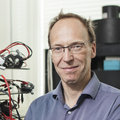
Dr. ir. Marnix Wagemaker will receive a Vici grant from NWO. Wagemaker is getting this grant, which amounts to 1.5 million euros, to investigate the inner workings of batteries. Among other things, the researcher aims to find out why the storage capacity achieved by the current generation of batteries is lagging behind that which should theoretically be feasible. An additional 250.000 euros of in-kind contributions will be provided by companies that are involved in the research.
22 February 2018
Loops, loops, and more loops: This is how your DNA gets organised
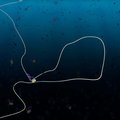
Researchers from the Kavli Institute of Delft University and EMBL Heidelberg now managed for the first time to isolate and film and witnessed—in real time—how a single protein complex called condensin reels in DNA to extrude a loop.
15 February 2018
Programming on a silicon quantum chip
Quantum technology makes a great leap forward. While scientists can control a few qubits with great reliability, it doesn’t yet look like a real computer. Useful quantum chips require programmability: the ability to perform an arbitrary set of operations. Scientists from QuTech in Delft have now realised a programmable two-qubit quantum processor in silicon successfully implementing two quantum algorithms. They have published their work in the magazine Nature.
12 February 2018
Designing and testing medical instruments without expensive prototypes
Complex new medical instruments often do not make it beyond the expensive and time-consuming prototype phase. With this in mind, Ewout Arkenbout developed a new, virtual development method allowing for instruments to be evaluated and adjusted at an earlier stage. On Monday 12 February, Arkenbout will be awarded his PhD at TU Delft for his work on this subject.
07 February 2018
Mathematics explains why Crispr-Cas9 sometimes cuts the wrong DNA
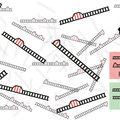
The discovery of the Cas9 protein has been of great value to medical science. It has simplified gene editing tremendously, and may even make it possible to eliminate many hereditary diseases in the near future. Using Cas9, researchers have the ability to cut DNA in a cell to correct mutated genes, or paste new pieces of genetic material into the newly opened spot. Initially, the Crispr-Cas9 system seemed to be extremely accurate. But unfortunately, it is now apparent that Cas9 sometimes also cuts other DNA sequences similar to the exact sequences it was programmed to target. Scientists at Delft University of Technology have developed a mathematical model that explains why Cas9 cuts some DNA sequences while leaving others alone.
05 February 2018
The quest to find the optimal speed skating technique
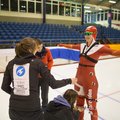
In her search to determine the optimal speed skating technique, doctoral candidate Eline van der Kruk developed a dynamic computer model of a skater and instrumented clap skates. In the future, these will make it possible to offer skaters and coaches real-time visual feedback during training sessions. On Thursday 8 February, the day before the start of the Winter Olympics, Van der Kruk will be awarded her PhD at TU Delft for her work on this subject.
01 February 2018
Clive Brown of Oxford Nanopore at Bioengineering Institute kickoff
On Tuesday 27 March, TU Delft will launch the Delft Bioengineering Institute. Main speaker is Clive Brown, Chief Technology Officer at DNA sequencing specialist Oxford Nanopore Technologies.
01 February 2018
Impact for a better society: TU Delft Strategic Framework 2018-2024
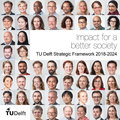
On 12 January, during the 176th Dies Natalis, the new strategic plan for TU Delft was presented, the Strategic Framework 2018-2024.
31 January 2018
Dutch drone first to map pristine national park in half a century
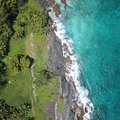
ATMOS UAV, a start-up company from the faculty of Aerospace Engineering, announced on 31 January that their drone Marlyn was used to chart the tropical island of Silhouette in the Seychelles in the Indian Ocean.
30 January 2018
Fiery romance: a risk-model for sky lanterns

This week it’s Valentine’s Day as well as Chinese New Year. A popular week for flying sky lanterns. How safe are they and how do you make a risk-model for them? Michiel Schuurman and Derek Gransden looked into it.
25 January 2018
From spin to light: two Delft scientists separately bring together two worlds
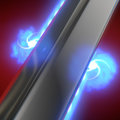
Two groups of scientists from TU Delft in the field of quantum nanotechnology have, independently of one another, found a way to convert spin information to light. The groups are led by professors Kobus Kuipers and Lieven Vandersypen, who both work at the Kavli Institute of Nanoscience. Their research has been published in Science. The discovery by Kuipers can lead to green ICT, for example energy-efficient data processing in data centres. The aim of Vandersypen's research is to allow large numbers of qubits on a chip to work together, bringing the quantum computer one step closer.
24 January 2018
GROW programme kicks off with a novel pile installation method ’Gentle Driving of Piles’

The first GROW project, ‘Gentle Driving of Piles’, received the approval of the Dutch RVO for granting a subsidy of 2.7 million euro. This project consortium is led by TU Delft and together with the GROW partners Boskalis, Deltares, DOT, Eneco, Sif, TNO, ECN, Shell, IHC, SHL and Van Oord, they will develop and test a novel pile installation method for offshore wind turbines.
24 January 2018
TU Delft develops virtual coach for patients with post-traumatic stress disorder
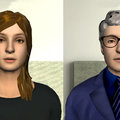
In the future, a virtual coach could make a positive contribution to the therapy of people with post-traumatic stress disorder (PTSD), such as war veterans or people who suffered sexual abuse in their youth. Such a coach could motivate people to persist with therapy and help them to recall traumatic memories as part of exposure therapy. The virtual coach was developed by Myrthe Tielman, who will be awarded her PhD at TU Delft on Thursday, 25 January.
23 January 2018
TU Delft scientists work on 3D printed dress designed by Iris van Herpen

Dutch fashion designer Iris van Herpen, who has designed outfits for Lady Gaga and Beyonce, has presented a dress at the Galerie de Minéralogie et de Géologie in Paris that was partly developed by TU Delft scientists.
19 January 2018
Building ‘scaled-down synchrotron’ begun
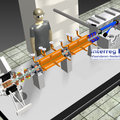
Detecting a hidden layer in a top work of art by Rembrandt, identifying metal fatigue in ships, predicting arteriosclerosis: these are just a few of the possible applications of Smart*Light, a synchrotron that fits on a table. Researchers at Eindhoven University of Technology and Delft University of Technology will build and develop this X-ray source within a consortium of other universities and companies. The high-intensity X-ray beam that this device will produce is now only available via large, expensive and scarce facilities. A symposium on Tuesday 23 January gets the research project officially under way.
18 January 2018
Using Hawkeye from the Avengers to communicate on the eye
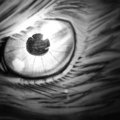
Popular culture characters, such as superheroes like Iron Man, Captain America, Wonder Woman, Batman and Hawkeye, can provide a unique and engaging platform for the communication of difficult scientific concepts. In the classroom, these characters can be used to communicate learning objectives to students in an interesting, fun, and accessible manner by taking advantage of student familiarity with these superhero characters. Hawkeye, a member of the Avengers, is one such superhero who can be utilized by educators, as Barry Fitzgerald of Delft University of Technology (TU Delft, The Netherlands) argues in the article ‘Using Hawkeye from the Avengers to communicate on the eye’, published in the journal Advances in Physiology Education.
15 January 2018
Majoranas on the rise
In 2012, the world of physics was rocked by the first observation of the exotic Majorana quasiparticle, in Leo Kouwenhoven’s laboratory. These particles are a promising candidate for robust quantum bits in a topological quantum computer of the future. A major challenge that lies ahead is how to manufacture usable, error-free quantum chips. By using new manufacturing methods, researchers from QuTech, in collaboration with TU Eindhoven, have successfully observed Majoranas in significantly improved conditions. This rules out alternative explanations and also represents another step towards the topological quantum computer of the future. The researchers published their findings today in Nature Nanotechnology.
15 January 2018
Crowdfunding for 4 inspiring Delft projects

Delft University Fund launches a crowdfunding platform to enable extraordinary projects at TU Delft.
05 January 2018
Discount on online courses for alumni

TU Delft kicks the New Year off with a great offer on online courses. And especially for alumni we have a gift that fits with the New Year’s resolutions: the first 100 participants have the opportunity to follow an online course with 175 euro (or a 25%) discount
22 March 2016
18th Economics of Infrastructures Conference on Local Energy Communities
21 October 2015
Loophole-free Bell test TU Delft crowns 80-years-old debate on nature of reality: Einsteins “spooky action” is real
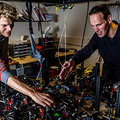
16 September 2014